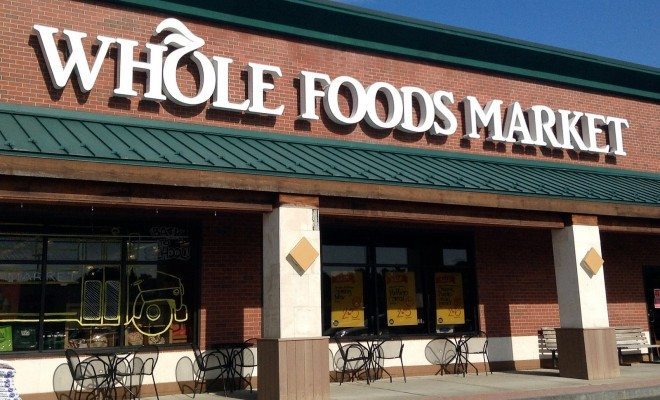 Image courtesy of [Mike Mozart via Flickr]
Image courtesy of [Mike Mozart via Flickr]
Law
Is Your Grocery Bill Breaking the Bank? It’s Not Just Whole Foods
You may have noticed lately that the prices at your local grocery store have been going up, and we tend to chalk it up to many things: rising gas prices, season, time of the month, or even the moon. Many of us will even pay more to shop in certain stores. When you think of grocery stores that cost a little for the ambience, you might think of Whole Foods. Just last week, the upscale grocery chain hit a rough patch when it was discovered that it has been overcharging its customers by a lot–and it has created problems for the grocery giant.
The Problem With Whole Foods
New York City’s Department of Consumer Affairs (DCA) is investigating the grocery chain for “systemic overcharging for pre-packaged foods” that affected several branches of the store. It was something that they had been monitoring for a long time, and had even warned the stores about; however, they found on multiple trips that there were many problems and incorrect markings.
Some of these problems were outlined in the DCA’s report, including packages that were labeled with heavier weights than they actually were:
- Vegetable platters that were priced at about $20 a package. The packages were all different sizes, averaging about $2.50 over. One package in particular was overpriced by a whopping $6.15.
- Chicken tenders, a staple in many households, were priced at about $9.99 per pound, but were marked up by an average of $4.13.
- Berries, currently in season, were priced at $8.58 a package, but customers were overcharged by $1.15.
These charges were widespread, and though they may only look like a few dollars, they likely added up quickly over time. The DCA concluded that “New York City stores routinely overstated the weights of its pre-packaged products — including meats, dairy and baked goods — resulting in customers being overcharged.”
However, Whole Foods spokesman Michael Sinatra says that the DCA hasn’t actually confronted the store:
Despite our requests to the DCA, they have not provided evidence to back up their demands nor have they requested any additional information from us, but instead have taken this to the media to coerce us.
This isn’t the first time this has happened. Just last year, Whole Foods had to pay an $800,000 fine in California for overcharging customers. So what can we do about this problem?
Rising Prices
The prices of different foods aren’t set by the government, like many think, but instead are a result of supply and demand. While the U.S. government does track prices, they are instead set by the wholesalers and growers of food.
One of the biggest causes of rising grocery costs is the prevalence of drought throughout the United States, especially in California. Drought affects everything from the crops that need water to survive to the cows that eat the grass. However, what the government can do is make sure that grocery stores are truthful when it comes to what they charge–and they can penalize those who don’t fall in line. In fact, that is exactly what they did to Whole Foods, which was fined “$950 for the first violation and up to $1,700 for a subsequent violation. The potential number of violations that Whole Foods faces for all pre-packaged goods in the NYC stores is in the thousands.”
Other Issues
Think the problem of overcharging is limited to just Whole Foods? There are a litany of other offenses that grocery stores have committed. In 2012, the Los Angeles Superior Court handed out a settlement of $1.1 million from Ralphs Grocery Co. because it overcharged its customers at the deli stand.
Some states, like North Carolina, allow for a small over- or under- charge on deli or weighted items. North Carolina allows a 5 percent discrepancy, but that hasn’t stopped the problem of overcharging. In fact, since November 2014, nine stores were fined by the state, including Dollar General, CVS, Target, and Walgreens, according to the North Carolina Department of Agriculture and Consumer Services.
What Can You Do?
Apart from reporting any discrepancies that you think you see to the management of your local grocer, what are some of the things that you can do to keep yourself from being taken advantage of?
There are multiple things you can do to check whether or not you are being charged too much at the grocery store. The New York Department of Consumer Affairs suggests checking your receipt for what can and cannot be taxed. They even offer a quick link to a hot list of items that can be taxed.
The Today Show, which did a whole segment on the charges, suggests that you should actually weigh items yourself just to make sure. Most grocery stores will have electronic scales that are fairly easy to work and will help you out. They also suggest that you should make sure you are paying for the things you actually get, and not things like ice on frozen fish or packaging.
Another suggestion is that instead of focusing on getting your money ready or looking at the candy bar display, you should watch as the cashier rings up your food items. You will catch many mistakes that way, and often they will be corrected without a fight.
Conclusion
At the end of the day, grocery stores are in the same market that everyone else is in: they want to make money. While there are governmental teams out there that can help with these problems, it is largely up to consumers to make sure that everything’s kosher.
When you are at the grocery store, try to be present and pay attention to the things you are purchasing. Understand that sometimes prices will rise and fall, but they should always be around the same price. Don’t be afraid to ask workers if something seems off, as you might just save yourself a few bucks and the company thousands in fines.
Resources
CNN: Whole Foods Accused of Massive Overcharging
Salon: Whole Foods is Ripping You Off (And it Has Been For Years)
Amarillo Globe-News: Several Factors Determine Food Prices at Grocery Stores
Class Action: Court Hands Victory to Workers in Wage and Hour Lawsuit
Fox News: New York City Says Whole Foods is Overcharging Customers
Journal Sentinel: State Fines Four Stores For Overcharging Customers
NY Eatery: City Sting Reveals Whole Foods Has Been Overcharging New Yorkers Since 2010
,Today Show: Not Just Whole Foods: Beware Supermarket Overcharges








Comments